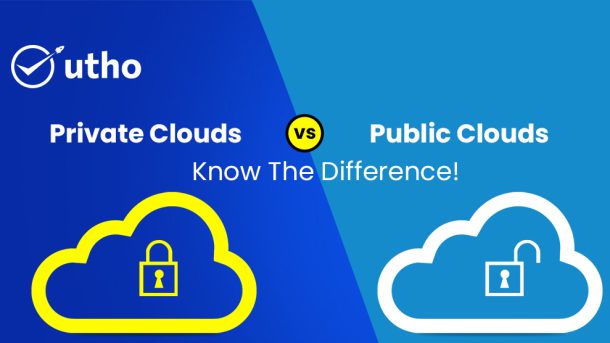Struggling to choose a private cloud or a public cloud for your business? You're not alone. Cloud computing is evolving quickly. It's important to contrast these options to pick the best one for your organization.
In this post, we'll discuss the key differences between private vs public clouds. We'll also look at their features, and their advantages and disadvantages. At the end of the day, you can choose the right model for your business.
Exploring the Concept of Private Clouds
A private cloud is like your own exclusive computer playground. This is a setup. Technical things, like infrastructure and services, happen on a private network. The network is only for your organization. This means you can learn about everything from security to customization.
Where does this cloud live now? It can be in your company's data center. Or, a third party can host it on hardware just for you.
This makes them perfect for companies with strict compliance. They are also great for those with high-security needs or those who want a custom cloud appliance exactly their business.
Here's why private clouds are great
State-of-the-art security and privacy
You get full control over your data and security. This means you have less to worry about sharing resources with others.
Tailored just for you
Want to do things your way? A private cloud lets you customize everything. You can change the hardware, software, and settings to fit your needs.
Smooth performance
Say goodbye to slowdowns. You have dedicated resources. You can trust your cloud to be up and running all the time.
Regulatory Compliance
Private clouds make it easier to follow industry regulations. You are in charge of where your data resides and who can access it.
Challenges of private clouds
Private clouds have their own challenges.
Difficult implementation
Setting up a private cloud is more complicated than using a public cloud. A dedicated IT team is required to manage the data center infrastructure.
High upfront costs
The upfront costs of buying, deploying, and maintaining a private cloud can be high.
Familiarity with these challenges guides companies in making well-considered decisions. It can help when they consider private cloud solutions.
How private clouds work
A private cloud uses software and hardware. They create a custom cloud for just one organization. This special setup can be on the organization's premises, like in its data center. Or, it can be managed by an outside provider.
The main players in private cloud infrastructure are computing resources (like servers). They are also IT storage systems and network devices. The virtualization layer controls all these elements. It is the core of the arrangement. Virtualization works by creating multiple virtual machines (VMs) on one physical server. It uses existing resources.
In addition, administrators use management tools to manage the private cloud ship. The tools allow them to efficiently allocate resources. They also use them to create and monitor security. They also use them to monitor how well everything is working and being used.
Understanding Public Clouds
Imagine a cloud full of computing power and services. It's available to anyone with an internet connection. That's a public cloud. In this setup, third-party service providers bring their tech online. They serve everyone from individuals to big companies.
Here's what makes public clouds tick
Flexibility at scale
Need more compute? Public clouds can adapt to your needs and handle spikes or drops in demand without breaking a sweat.
The Pennywise Approach
Forget big upfronts. Public clouds are pay-as-you-go, meaning you only pay cash for what you use. It's the same as paying only for drinking water instead of the whole tank.
User-friendly atmosphere
Setting up a store in the public cloud is easy. The providers deal with the technical issues behind the scenes. This keeps the services smooth and secure. That way, you can focus on work without infrastructure details.
Service potion
They have cutting-edge analytics and amazing AI tricks. Public clouds offer a wealth of technical delights. This means that businesses can use advanced tools. They can do so without spending on fancy hardware.
In short, public clouds are like the busy marketplaces of the digital world. They are vibrant, open, and full of all you need to make your digital dreams come true.
Challenges of Public Clouds
Although public clouds offer many advantages, they also come with some challenges. It is important to be aware of these shortcomings and find ways to improve them.
Additional costs
Public clouds are usually cheaper than private options. But, it is important to consider the extra costs. Make sure you have a clear idea of potential costs to create a realistic budget.
Lack of cloud experience
Finding qualified professionals with cloud experience can be difficult. To build an agile team, it is important to retain talented people and invest in training.
Limited control
Public clouds often offer limited control over configuration and settings. This can be difficult for some businesses. However, many service providers are becoming aware of these needs. They are improving their services to offer more options for customization.
By finding and fixing these challenges, companies can better use public cloud benefits.
How Public Clouds Work
Public clouds provide many services. These services are hosted on a service provider's infrastructure. They save organizations and individuals from managing physical servers and data centers.
Users use a browser or API to access these services. Resources are allocated based on demand. Virtualization is key here. It ensures efficient use of resources and scales them as needed.
The best public cloud providers rely on huge global data centers. They use them for reliability, speed, and constant uptime.
Finding the Right Fit: Matching Your Needs with the Ideal Cloud Service
Deciding between private vs public clouds depends on what works best for your organization. Here is a road map to help you make that choice.
Security and Compliance
Your industry needs top security and compliance (like healthcare or finance). A private cloud may be more secure.
Scalability and Flexibility
Want to adapt to rapidly changing requirements? Public clouds can grow or shrink on the fly. They are ideal for businesses with changing or rapidly growing needs.
Cost Estimates
Private clouds require large initial investments in hardware and ongoing maintenance costs. Public clouds work on a payment model. This makes them more budget-friendly. This is especially so for startups and SMBs.
Total Cost of Ownership
Use the numbers to see which option offers the best value. Consider installation and running costs.
Innovations and Services
Public clouds open the door to many new technologies and services. These include artificial intelligence and big data analytics. You get them without having to build them from scratch.
Reliability and Availability
Public and private clouds provide reliable options. Global networks from public providers add redundancy and availability. Consider these factors to find the best cloud solution for your organization's needs and goals.
Applications: Where They Excel
Knowing where and how public and private clouds are evolving will help businesses. It will help them choose the right solution for their needs.
Public Cloud Use Cases
Startups
Startups love public clouds. They provide scalability without big upfront costs. This allows the startup to focus on growth rather than infrastructure.
Fast-moving technology
Fast-growing technology companies benefit from the flexibility of the public cloud. They can adapt quickly without having to buy extensive equipment.
Seasonal applications
Retailers and other businesses with seasonal demand prefer public clouds. They can scale their resources as needed and optimize their costs.
Private Cloud Use Cases
Financial Institutions
Private clouds are ideal for financial institutions. This is because they have strict regulations and security needs. They ensure its data security and regulatory compliance.
Healthcare
Healthcare organizations need a private cloud to comply with privacy regulations. They provide a secure environment for sensitive patient data and support critical applications.
Government Agencies
Governments prioritize security, so private clouds are essential. They allow you to manage sensitive data and operations.
Choosing the right cloud solution is key. The choice between private vs public clouds. This enables businesses to ensure efficiency, security and scalability. They can customize it according to their needs.
Summup
In the end, the choice between private vs public Clouds depends on your organization's needs. Private clouds offer dedicated resources, tight security, and control. Public clouds offer scalability, cost-effectiveness, and easy installation.
For many businesses, a hosted private cloud like Utho can be an excellent choice . It offers the best of both worlds. By understanding these differences and matching them to your goals, you can choose the right cloud solution. It will move your organization forward.



